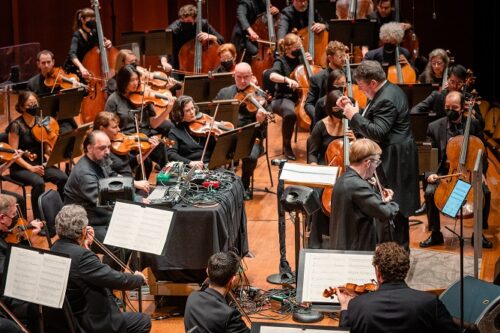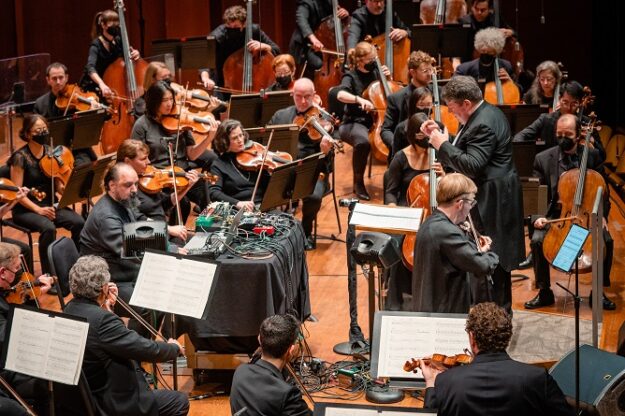 United States Various: Pekka Kuusisto (violin), Seattle Symphony Orchestra / Andrew Litton (conductor). Benaroya Hall, Seattle, 5.11.2022. (ZC)
United States Various: Pekka Kuusisto (violin), Seattle Symphony Orchestra / Andrew Litton (conductor). Benaroya Hall, Seattle, 5.11.2022. (ZC)

Ravel – La Valse
Enrico Chapela – Antiphaser: Concerto for Electric Violin and Orchestra
Debussy – Prélude à l’après-midi d’un faune, La Mer
Concertos for electric violin are not common, but they are becoming more so. Established American composers – such as John Adams and Terry Riley – have written concertos for the instrument, but so too have newer voices like Brett Dean. After a world premiere performance this past weekend by the Seattle Symphony, we can add Mexican composer and guitarist Enrico Chapela to this exclusive but growing list. The orchestra and Finnish violinist Pekka Kuusisto, assisted by the composer, performed his new concerto for the instrument (Antiphaser) in Benaroya Hall. It had been co-commissioned by the Seattle Symphony which, even during its current artistic transition, has kept up an aggressive program of commissioning and performing new works.
Chapela describes Antiphaser as a cosmic thought experiment: what would someone see from the moon during an eclipse? His own eclectic musical background guides him in this endeavor to describe that which no one has witnessed. The son of a chemist and a physicist, he thought he would be a scientist as well, until he discovered the electric guitar, and music’s pull ultimately won out. Chapela pays homage to the scientific lineage in his family with compositions like Antiphaser and MAGNETAR (an earlier concerto for electric cello). But his style also draws in popular rock and metal influences with homage to the ‘masters’ whose works also expanded what was to be expected by orchestras and performers.
I was hearing the piece for the first time, and Chapela’s description was not necessary for me to enjoy it as pure music. The concerto is a journey of virtuosity and electronic effects in four interconnected movements. Kuusisto gave an exacting performance, creating yawning effects that Chapela, at a table behind the soloist, manipulated. These careful augmentations, however, never concealed the composition’s ‘traditional’ dimensions as a concerto. An onslaught of tricky passages kept Kuusisto on his toes, while the orchestra provided equal excitement in their give and take with the soloist. As an encore, he treated us to an electric violin improv session that showcased the violinist manipulating simple phrases to produce an Eno-esque ambience.
Originally, this series of concerts was to be led by Canadian conductor Alexander Shelley. But Andrew Litton had to step in due to ongoing – and no doubt frustrating – administrative challenges processing visas for the U.S. immigration system. Litton’s career has taken him to orchestras around the world, where he has established an exemplary discographic record of his talent, and this encounter with the Seattle Symphony provided more proof. To accompany an engaging performance of the new concerto, Litton provided exciting, sculpted performances of Debussy and Ravel standbys. Ravel’s La Valse preceded Antiphaser, while the second half featured Debussy’s La Mer and Prélude à l’après-midi d’un faune. Litton’s interpretation of La Mer rippled with tension, while La Valse brimmed with misshapen Viennese appeal. Even Debussy’s Prelude gleamed with sultry warmth, due in no small part to principal flute, Demarre McGill.
Even though Litton was a fill-in, I hope he comes back. I am certain I have never heard him conduct the SSO before, and that is a shame. On the surface, he might seem like a throwback conductor in appearance and without a flashy stick technique or overwrought gestures. This is exactly why I hope he gets another chance with the SSO, in a program of his own creation: extraordinary can stem from the seemingly ordinary.
Zach Carstensen
